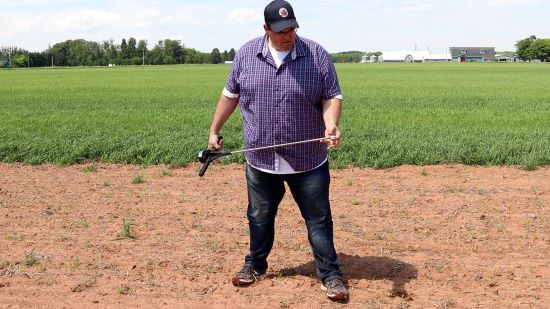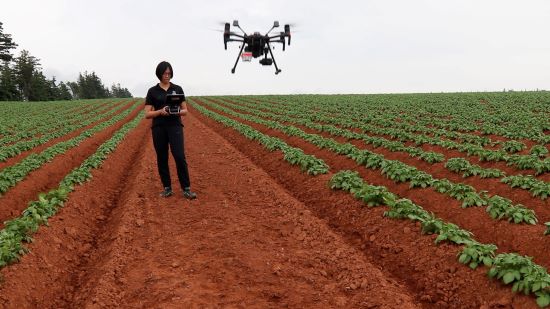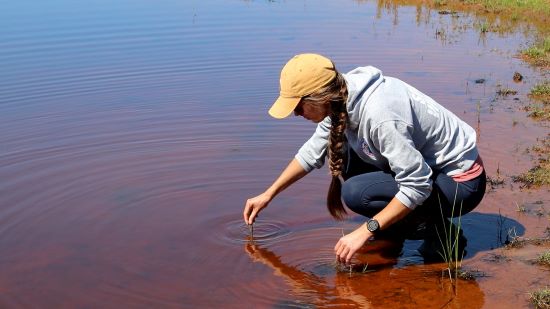Located on Prince Edward Island, Living Lab – Atlantic on-farm research is taking place in the Dunk River, Kensington North and Souris watersheds, as well as at the Agriculture and Agri-Food Canada Harrington Research Farm.

Description of above image
A map of Prince Edward Island highlighting the locations of four regions where Living Lab – Atlantic research is taking place. These regions include Harrington Research Farm, Souris Watershed, Kensington North Watershed, Dunk River Watershed. The Dunk River Watershed is magnified to highlight four additional subwatersheds – Webster Creek, Maple Plains, Johnson Creek and Breadalbane. Prepared by Agriculture and Agri-Food Canada. Watershed boundary data provided by Environment and Climate Change Canada. Basemap provided by Earthstar Geographics.
Prince Edward Island's landscape has a rolling topography with well-drained sandy loam soil and intermittent streams and watercourses. This iron rich soil is prone to weathering (oxidation or rusting) which creates its famous red colour. The soil is also prone to erosion and leaching of nutrients and other contaminants such as pesticides.
Prince Edward Island is one of the largest producers of potatoes in Canada. Some traditional farming practices have the potential to negatively affect the province's soil and water resources. Farmers and collaborators have identified that the reduction of the environmental impacts associated with potato production, through modern and innovative practices, as the primary objective of Living Lab - Atlantic. In particular, the work will focus on developing and testing farming practices to address:
- Soil health
- Water quality
Collaborators
- Agriculture and Agri-Food Canada
- Participating producers within the three watersheds
- East Prince Agri-Environment Association (Lead collaborator)
- Dalhousie University – Faculty of Agriculture
- Ducks Unlimited Canada
- Environment and Climate Change Canada
- Fisheries and Oceans Canada
- Genesis Crop Systems Inc.
- Kensington North Watersheds Association
- Prince Edward Island Department of Agriculture and Land
- Prince Edward Island Potato Board
- Prince Edward Island Watershed Alliance
- Souris and Area Branch of the PEI Wildlife Federation
- St. Francis Xavier University
- University of New Brunswick
Activities
Beneficial management practices
The objective is to investigate potential farming practices using innovative cover crops and companion crops.
Lead collaborator or Agriculture and Agri-Food Canada activities:
- Identify fall and winter cover crops that reduce soil erosion and reduce nutrient loss to waterways
- Evaluate companion crops with potato and corn crops to reduce soil erosion, wind erosion and increase yield
Innovative nutrient management techniques
The objective is to examine ways to manage nutrient flow and runoff in farm fields, and the implementation of farming practices to increase soil organic matter.
Lead collaborator or Agriculture and Agri-Food Canada activities:
- Evaluate the impacts of cropland management practices on soil health and fertility
- Identify soil tillage practices, fertilizer applications, cover crops and rotational crops that build soil organic matter in potato production systems
- Evaluate how soil building management strategies impact crop yields, nutrient cycling, carbon quality, soil microbial diversity, weed and disease pressure
- Identify soil properties to understand how to reduce impacts in waterways and estuaries
- Develop management practices for fertilizer use to reduce nutrient loss to waterways
- Evaluate a four-year crop rotation for potatoes compared to a three-year rotation to reduce pesticide use and increase yield
- Develop a predictive soil map of soil microbial diversity and soil organic matter on Prince Edward Island
Management of water quality and quantity
The objective is to identify and demonstrate farming practices for the management of water (irrigation, drainage and retention).
Lead collaborator or Agriculture and Agri-Food Canada activities:
- Identify potato varieties and slow-release fertilizers that require less water and reduce contaminants leaching into groundwater
- Evaluate optimal irrigation strategies to reduce water use, and reduce nutrient leaching while monitoring soil health, insect communities and potato crop productivity
- Maximize water holding capacity while minimizing environmental risks
- Assess the performance of on-farm wetlands, bioreactors and vegetated waterways to filter nutrient and pesticide runoff before entering waterways
Socio-economic studies
The objective is to support and understand farmer decision-making to adopt farm management practices.
Lead collaborator or Agriculture and Agri-Food Canada activities:
- Conduct financial, economic and social studies at both individual farm and watershed scales
- Identify costs, benefits and barriers to implementing new practices by farmers
Engagement, education and outreach
The objective is to undertake engagement, education and outreach activities to increase the adoption of new farming practices.
Lead collaborator or Agriculture and Agri-Food Canada activities:
- Communicate the environmental and economic benefits of new practices to the farming community
- Use a variety of traditional and innovative methods to transfer knowledge, including demonstrations, workshops, videos and peer-to-peer learning opportunities
Videos

Soil building crops in rotation with Prince Edward Island potatoes can conserve and build organic matter in soil which helps reduce greenhouse gases.

University of Prince Edward Island scientist and Living Lab – Atlantic collaborator is using drone thermal imagery to detect drought stress in crops.

Souris and Area Branch of the Prince Edward Island Wildlife Federation highlights one of four new wetlands constructed on farms.
Enhanced efficiency fertilizers (Video)

Prince Edward Island farmers and scientists test enhanced efficiency fertilizers which decrease contaminants from entering groundwater.
Related information
- Living Lab — Atlantic uncovers the green energy of cover crops for the environment and farmer's yields
- Living Lab — Atlantic research solidifies enhanced efficiency fertilizer as a win-win for farmers and the environment
- The conservationist and the bog: How Frances Braceland helped bring new life to PEI wetlands
- Going with the flow: AAFC's newest Prince Edward Island scientist researching natural solutions for sustainable water
- Living Lab — Atlantic Field Trip: Protecting water in Kensington
- Living Lab — Atlantic Field Trip: Wetlands cropping up in Souris
- Living Lab — Atlantic Field Trip: Being precise in Spring Valley
- Living Lab — Atlantic Field Trip: Protecting soil in Harrington
- Winter cover crop research yields positive results for environment
- Wetlands and Farmlands: Celebrating World Environment Day